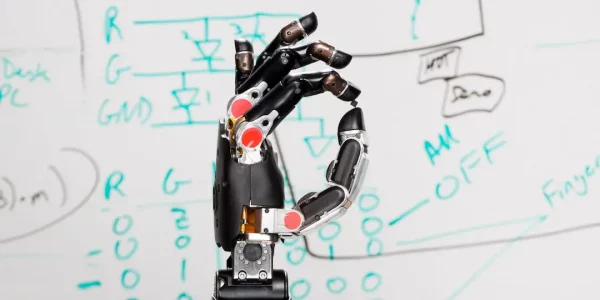Recently, an important milestone in the prosthetics industry was achieved when a quadriplegic volunteer was able to feel physical sensations through a prosthetic hand for the first time. This breakthrough result comes from a research project conducted by scientists at the Johns Hopkins Applied Physics Laboratory (APL), funded by DARPA (Defense Advanced Research Projects Agency), and was announced in November 2023.
This study not only opens up a new possibility in controlling prosthetic limbs but also allows users to perceive physical sensations such as pressure or touch. According to an official statement from APL and DARPA, researchers implanted electrode arrays into the sensory and motor regions of a paralyzed volunteer’s brain to enable him to feel the sensations from the prosthetic hand. These electrode arrays helped transmit sensory signals from the prosthetic hand directly to the brain.
“This advancement, achieved through advanced neural technology, promises a future where people with disabilities or those living with quadriplegia may not only control prosthetic devices but also accurately perceive the physical sensations they experience,” according to Johns Hopkins Applied Physics Laboratory (2023).
Initial tests showed that the volunteer could precisely identify which finger of the prosthetic hand was being touched, even when blindfolded. “The sensation is almost identical to when my real hand is being touched,” the volunteer shared. This proves that tactile sensations can be recreated through electrical signals, opening up significant opportunities for developing technologies that help people with disabilities better interact with the world around them. This is an important step forward, not only technologically but also in its application to assist people with disabilities.
This is not the first time scientists have explored connecting prosthetic limbs with sensory feedback, but this work marks a significant leap in bringing this technology closer to real-world applications. This technology not only provides hope for people with disabilities but could also have broader applications in fields such as human-machine interfaces in the future.

Scientists hope that in the future, this technology will be widely developed, helping restore sensory capabilities for individuals with disabilities or neurological disorders, bringing a brighter future to those facing life’s challenges.


HPX24h > Science > The First Person to Experience Physical Sensations Through a Prosthetic Hand
Top Reads from This Category
Science
Why Do Adult Brains Continue to Generate New Neurons?
Science
Work 3.5 Days a Week and Live to 100: This Could Be Your Future
Science
Stem Cell Therapy for Lung Cancer: A New Hope Entering Human Trials
Science
Why Cultured Meat Could Be the Future of the Food Industry
Science
AI Can Simulate Evolution and Create Proteins – A New Opportunity for Breakthrough Medical Therapies
Science
Turning Dreams On and Off with Brain-Control Technology: A Breakthrough in Sleep Researc
Science
China’s Hypersonic Jumbo Jet Could Cut Beijing to New York Flight Time to Just 2 Hours
Discover New Topics
Fitness
Fat-Burning Heart Rate: The Key to Optimizing Your Workout
Animals
Explaining How Mosquitoes Can Fly Through a Rainstorm
Uncategorized
Why Do Experts Believe Alzheimer’s Is an Autoimmune Disease Rather Than a Brain Disorder?
Healthy Eating
The Benefits and Risks of the Keto Diet: Is It Really Good for Your Health?
Parenting Tips
Excessive Night Sweating in Children – A Normal Occurrence or a Cause for Concern?
Health
Are ‘Forever Chemicals’ Present in Bandages? How This Could Affect Your Health
Science
Can Pregnant Women Experience Temporary Memory Loss? The Secrets Behind Brain Changes During Pregnancy
Healthy Eating
What Is Nutrition? Why Is It Important For Health?
Healthy Eating
Does Drinking Water Help with Weight Loss? The Science Behind It and How to Apply It Properly
Fitness
Aerobic and Anaerobic: The Right Training Secrets for Overall Health and Strength
Parenting Tips
How to Talk to Your Child About Drugs Effectively
Healthy Eating
The Comprehensive Guide to the 16:8 Intermittent Fasting Diet
Health
Why You Shouldn’t Skip a Protein-Rich Breakfast